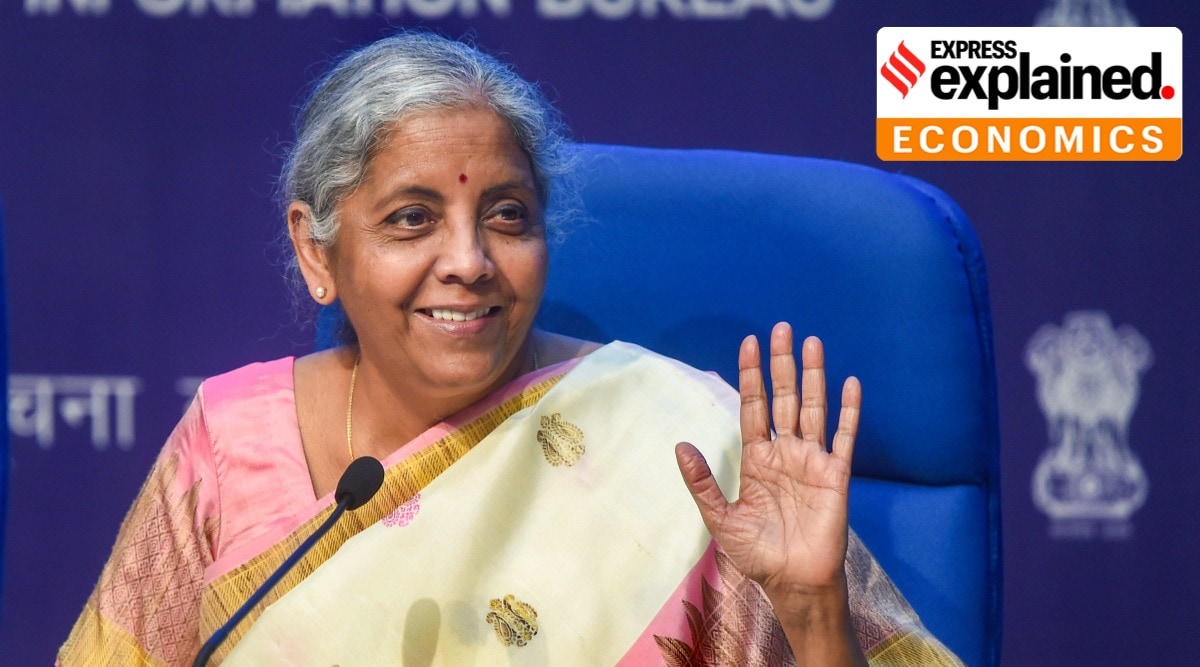Explained: What are virtual digital assets and how are they different from digital currency?
Virtual digital asset vs digital currency: Here's how the government differentiates cryptocurrencies such as Bitcoin from a digital currency.
 Union Finance Minister Nirmala Sitharaman addresses a post Budget press conference in New Delhi, Tuesday, Feb. 01, 2022. (PTI Photo/ Shahbaz Khan)
Union Finance Minister Nirmala Sitharaman addresses a post Budget press conference in New Delhi, Tuesday, Feb. 01, 2022. (PTI Photo/ Shahbaz Khan)Finance Minister Nirmala Sitharaman, in her Budget 2022 speech on Tuesday (February 1), announced a 30 per cent tax on income from virtual digital assets. She said that there has been a phenomenal rise in such transactions and the magnitude and frequency of these transactions have made it imperative to provide for a specific tax regime.
She further clarified that no deduction in respect of any expenditure or allowance shall be allowed while computing such income except the cost of acquisition. Additionally, she also proposed a TDS on payment made in relation to the transfer of virtual digital assets at 1 per cent above a monetary threshold.
In short, the finance minister has proposed a flat 30 per cent tax on digital asset gains regardless of any long-term or short-term holding by the investor. Additionally, if a virtual digital asset investor incurs losses during the transaction, it can’t be set off against any other income. The gifting of virtual digital assets has also been proposed to be taxed in the hands of the recipient.
What are virtual digital assets and how are they different from digital currency?
In her post-budget media interaction, Sitharaman explained that a currency can be defined if it is issued by the central bank. “I said the Reserve Bank will be issuing a digital currency, a currency is a currency only when it is issued by the central bank even if it is a crypto. But anything which is outside of that loosely all of us refer it to be cryptocurrency but they are not currencies,” she said when asked about cryptocurrencies.
She clarified that what the RBI issues in the next fiscal will be the digital currency and everything else apart from that are digital assets being created by induviduals and the government will be taxing the profit which are made during transactions of such assets at 30 per cent.
In the memorandum explaining the provisions in the Finance Bill, the government said that “Virtual digital assets have gained tremendous popularity in recent times and the volumes of trading in such digital assets has increased substantially. Further, a market is emerging where payment for the transfer of a virtual digital asset can be made through another such asset. Accordingly, a new scheme to provide for taxation of such virtual digital assets has been proposed in the Bill.”
How does the government define virtual digital assets?
In the explanatory memorandum of the Finance Bill, the government stated, “To define the term “virtual digital asset”, a new clause (47A) is proposed to be inserted to section 2 of the Act. As per the proposed new clause, a virtual digital asset is proposed to mean any information or code or number or token (not being Indian currency or any foreign currency), generated through cryptographic means or otherwise, by whatever name called, providing a digital representation of value which is exchanged with or without consideration, with the promise or representation of having inherent value, or functions as a store of value or a unit of account and includes its use in any financial transaction or investment, but not limited to, investment schemes and can be transferred, stored or traded electronically. Non fungible token and; any other token of similar nature are included in the definition.”
Newsletter | Click to get the day’s best explainers in your inbox
- 01
- 02
- 03
- 04
- 05






































